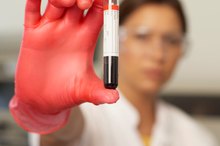Iron Dosages for Anemia With Bruising
Anemia is a condition in which you have low iron levels. Iron is an important nutrient because it helps your body make red blood cells and it helps your blood carry oxygen. Iron is found in a variety of sources such as beans; leafy green vegetables; beef; and in other meats such as duck, lamb and shrimp. While iron is available in many foods, you can still develop an iron deficiency if you’re not consuming enough of the mineral. Before beginning any type of treatment for anemia, be sure to consult your physician for advice.
Iron Doses
If you suffer from an iron deficiency, you can correct it by consuming the recommended daily intake. The amount of iron your body needs will depend upon your gender and age. Adult women require 18 mg of iron while men need only 8 mg per day. Pregnant women need more iron — 27 mg per day. Lactating women should have less iron, only about 8 mg per day.
- If you suffer from an iron deficiency, you can correct it by consuming the recommended daily intake.
- Lactating women should have less iron, only about 8 mg per day.
Symptoms of Iron Deficiency
How to Raise Hemoglobin Levels Fast
Learn More
If your iron levels become too low, you may feel tired and week, according to the Centers for Disease Control. Feeling tired and weak may be a result of low oxygen levels since there’s not enough iron to carry an abundant amount of oxygen to other parts of your body. You may also have difficulty maintaining your body temperature and develop an inflamed tongue. Your immune system may become weak and decreased, which could lead to more illnesses that your body could have otherwise fought off.
- If your iron levels become too low, you may feel tired and week, according to the Centers for Disease Control.
- Your immune system may become weak and decreased, which could lead to more illnesses that your body could have otherwise fought off.
Vitamin C
Vitamin C helps your body absorb iron. The CDC recommends consuming vitamin C-rich foods with iron during your meal to enhance the absorption of iron. You could develop anemia, or a low level of iron, due to a vitamin C deficiency, according to MedlinePlus. An iron deficiency alone would not cause bruising, but bruising can occur with a vitamin C deficiency. In addition to bruising, a vitamin C deficiency can also weaken your immune system and cause additional problems such as rough, dry skin; nosebleeds; dry and splitting hair; bleeding gums; and painfully swollen joints.
- Vitamin C helps your body absorb iron.
- An iron deficiency alone would not cause bruising, but bruising can occur with a vitamin C deficiency.
Considerations
Side Effects of Floradix
Learn More
If you believe that you are suffering from anemia, ask your physician to test your iron and vitamin C levels. You may need to increase your vitamin C levels to improve the absorption of iron so that you can combat anemia. If you’re suffering from bruising easily, you may not even have low iron levels, but instead have a vitamin C deficiency.
Related Articles
References
- KidsHealth.org: Iron-Deficiency Anemia; Oct. 2010
- MedlinePlus: Vitamin C; Feb. 2011
- Camaschella C. Iron deficiency: new insights into diagnosis and treatment. Hematology Am Soc Hematol Educ Program. 2015;2015:8-13. doi:10.1182/asheducation-2015.1.8
- Pawlak R, Berger J, Hines I. Iron Status of Vegetarian Adults: A Review of Literature. Am J Lifestyle Med. 2016;12(6):486–498. doi:10.1177/1559827616682933
- DRI: Dietary Reference Intakes for Vitamin A, Vitamin K, Arsenic, Boron, Chromium, Copper, Iodine, Iron, Manganese, Molybdenum, Nickel, Silicon, Vanadium, and Zinc. Washington, D.C.: National Academy Press; 2001.
- Alaunyte I, Stojceska V, Plunkett A. Iron and the female athlete: a review of dietary treatment methods for improving iron status and exercise performance. J Int Soc Sports Nutr. 2015;12:38. doi:10.1186/s12970-015-0099-2
- Mirza FG, Abdul-kadir R, Breymann C, Fraser IS, Taher A. Impact and management of iron deficiency and iron deficiency anemia in women's health. Expert Rev Hematol. 2018;11(9):727-736. doi:10.1080/17474086.2018.1502081
- Hegazy AA, Zaher MM, Abd El-Hafez MA, Morsy AA, Saleh RA. Relation between anemia and blood levels of lead, copper, zinc and iron among children. BMC Res Notes. 2010;3:133. Published 2010 May 12. doi:10.1186/1756-0500-3-133
- Qin Y, Melse-Boonstra A, Pan X, et al. Anemia in relation to body mass index and waist circumference among Chinese women. Nutr J. 2013;12:10. doi:10.1186/1475-2891-12-10
- Cleveland Clinic. Leukemia. Updated October 31, 2016.
- Merck Manual Professional Version. Iron Deficiency Anemia. Updated July 2018.
- Johns Hopkins Hospital. Iron-Deficiency Anemia.
- Abu-Ouf NM, Jan MM. The impact of maternal iron deficiency and iron deficiency anemia on child's health. Saudi Med J. 2015;36(2):146–149. doi:10.15537/smj.2015.2.10289
- National Institute of Diabetes and Digestive and Kidney Diseases. Hemochromatosis. Updated March 2014.
Writer Bio
Derek Buckner has been writing professionally since 2005, specializing in diet, nutrition and general health. He has been published in "Today's Dietitian," "Food Essentials" and "Eating Well Magazine," among others. Buckner is a registered dietitian and holds a Bachelor of Science in nutrition and food science from Drexel University.









